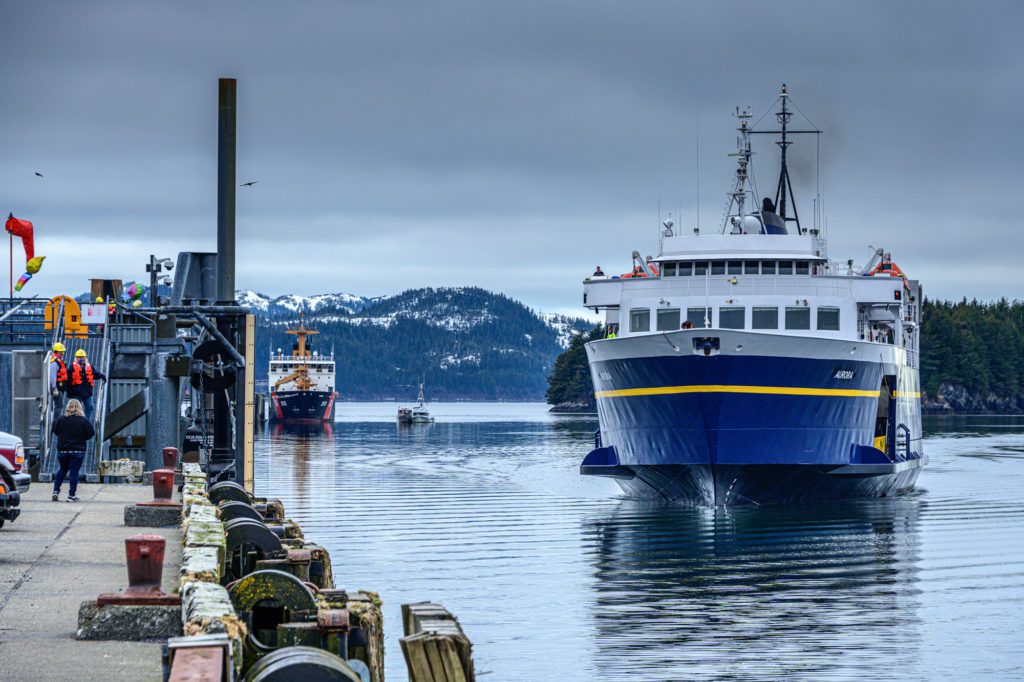
A hefty $1 trillion bill taken up by the U.S. Senate on Monday, Aug. 2, contains billions of dollars in new federal funding for infrastructure projects in Alaska, ranging from ports and energy resources to broadband and $1 billion for ferry service in rural communities.
The budget for a new program establishing an essential ferry service proposed by Sen. Lisa Murkowski, R-Alaska, would provide funding for the Alaska Marine Highway System, as well as other projects involving roads, bridges, rail, ports, airports, energy, water and wastewater systems, and broadband systems.
The Senate has just begun considering amendments to the Infrastructure Investment and Jobs Act, written by a group of 10 Democrats and Republicans, including Murkowski. While changes are coming, the legislation is being hailed as an important compromise to take on a backlog in the nation’s infrastructure needs and deal with the challenges of extreme weather events attributed to climate change.
“Whether it’s rebuilding existing infrastructure, driving innovative technology, or addressing the lack of basic infrastructure in rural communities, this bill will create economic opportunities and improve the lives of Alaskans across the state,” Murkowski said. “This bill prioritizes our marine highway system and ports that are so vital to connecting communities off the road system, invests in critical water infrastructure to bring clean water to families, supports an all-of-the-above portfolio of energy projects to make energy cleaner, more reliable and affordable, and bolsters our nation’s mineral security.”
Also included are provisions to strengthen broadband access. Access to high-speed internet will result in improved telehealth, commerce and tele-education resources, Murkowski said.
The marine highway section of the legislation includes $250 million for an electric or low-emitting ferry pilot program, with at least one pilot to be conducted in Alaska, the state with the most marine highway system miles. Alaska has 3,100 miles of marine highway, much of it in Southeast Alaska.
The $337 million in the bill for construction of ferries and ferry terminal facilities includes $73 million for Alaska. It would provide authorization for recipients of these funds under the program to spend them on ferry operating costs. Alaska operators who previously received formula funds under this program in fiscal year 2020 were the Alaska Marine Highway System, Ketchikan Gateway Borough Inter-Island Ferry Authority and the Seldovia Village Tribe.
The package includes $35 billion in federal aid highway formula funds for Alaska over five years to construct, rebuild and maintain roads and highways, plus $225 million for Alaska to address over 140 bridges considered to be structurally deficient. Also in the roads package is authorization for reconstruction of the Shakwak Highway from Haines to Haines Junction, the Alaska Highway from the Alaska border at Beaver Creek, Yukon Territory, to Haines Junction in Canada, and the Haines Cutoff Highway from Haines Junction in Canada to Haines, Alaska, in support of the U.S. agreement with Canada.
Airport funds include money for the FAA Airport Improvement Program, including FAA-owned Air Traffic Control facilities and contract towers in Alaska.
Water funds include more than $180 million over five years for water and wastewater projects in Alaska through the Clean Water State Revolving Fund and Drinking Water State Revolving Fund programs, plus $3.5 billion for Indian Health Services sanitation facilities. Currently 32 of the 190 rural Alaska Native communities are still unserved and lack access to in-home water and sewer service.
The bill also includes $10 billion overall for states to address PFAS contamination through Clean Water and Drinking Water programs, with a focus on small and disadvantaged communities.
PFAS substances are per- and polyfluoroalkyl substances, manmade chemicals that are hazardous to human health.
Aid for tribal climate resilience amounting to $216 million, is included over five years for adaptation and community relocation planning, design and implementation of projects which address varying climate challenges facing tribal communities nationwide. Of that total, $130 million is for community relocation and $86 million is for climate resilience and adaption projects.
Millions more dollars are tucked into the bill for energy and natural resources, including $355 million for the Energy Storage Demonstration Projects and Pilot Grants Program to ensure more efficient energy storage infrastructure.
Funds for natural resources-related infrastructure, wildfire management and ecosystem restoration include:
- $250 million for decommissioning, road and trail repair and maintenance, and removal of fish passage barriers significant for restoring salmon and other fish habitat in Alaska’s national forests.
- Over $3.3 billion for mechanical thinning, controlled burns, fuel breaks and other activities to reduce wildfire danger on Interior and Forest Service lands, including those in Alaska. This includes pre-commercial thinning important for subsistence resources and improving growth of young tree stands in the Tongass National Forest.
- Over $2.1 billion for the Interior Department and Forest Service to restore ecological health of federal lands and waters and private lands, through voluntary efforts, via programs partnering with states including Alaska.
- $20 million for construction, reconstruction, operation and maintenance of recreation public use cabins. There are over 155 of these cabins in the Tongass and another 50 in the Chugach national forests.
- $100 million for workforce training for firefighting and vegetation management that specifically includes Native village fire crews.





